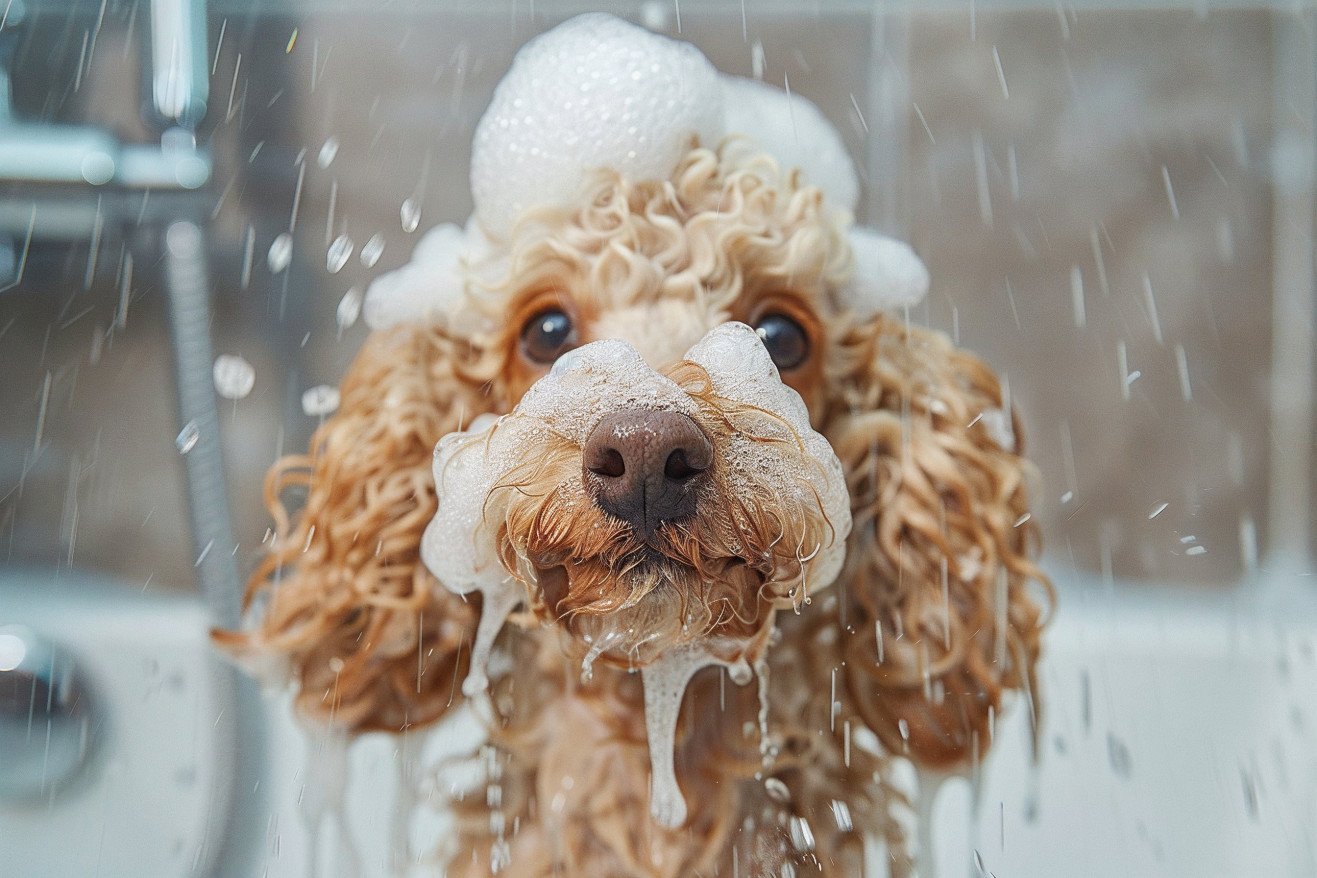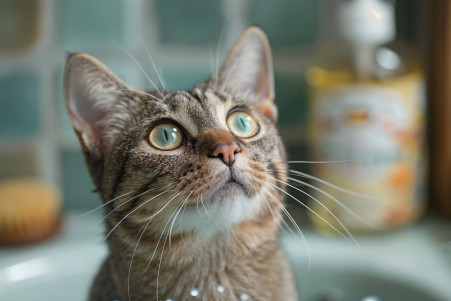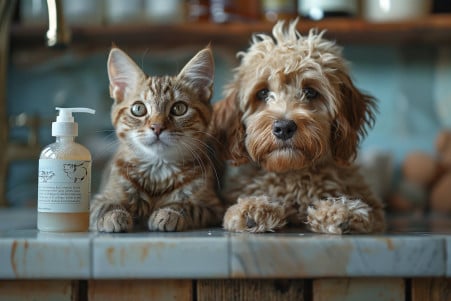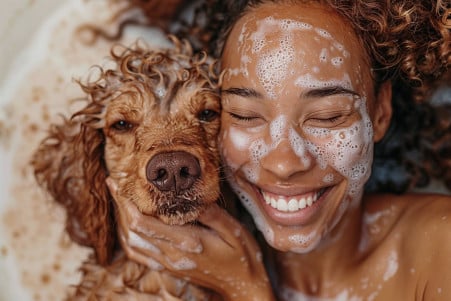Can You Use Dawn Dish Soap on Dogs? The Benefits and Risks
30 May 2024 • Updated 28 May 2024

Since it's a product that's found in many homes, pet parents often wonder if dawn dish soap is safe to use around their dogs. While dawn dish soap isn't approved by the FDA for use on pets, it can be used to bathe dogs in some cases if it's diluted and the dog is rinsed well. The surfactants in dawn that help cut through oil and grease can also help when it comes to removing oils and grease from a dog's coat, such as skunk spray, motor oil/grease, or porcupine quills.
This article will review studies from veterinarians, animal safety professionals, and pet parents to discuss the potential advantages and disadvantages of using dawn dish soap on dogs. By learning about the research on dawn's ingredients and hearing people's stories, you can decide if this popular product could be a safe way to occasionally bathe your dog.
Is Dawn dish soap safe to use on dogs?
Safe and Effective Alternatives to Dawn for Dog Bathing
Although Dawn dish soap can be used in a pinch, the best and most effective option for regular bathing is a veterinarian-approved dog shampoo, which is specially formulated for a dog's skin and coat. For those who are looking to save money, homemade shampoos made with natural ingredients like white vinegar, baking soda, and mild dish soaps can be used occasionally.
Dogs with sensitive skin can use oatmeal-based shampoos that include soothing ingredients like aloe vera, chamomile, and manuka honey to help nourish and soothe irritated skin. If you're looking to treat fleas or ticks, there are plant-based shampoos that include essential oils like peppermint, thyme, and rosemary that can kill fleas and ticks on contact without using harsh chemicals.
While baby shampoo can be used in a pinch, it's not recommended as a regular alternative because it can still dry out and irritate a dog's skin. It's important to find the right specialized product for your dog's skin and coat needs.
Natural Flea and Tick Prevention for Dogs
Natural solutions can also be used to effectively and safely prevent and treat fleas and ticks on dogs. The AKC notes that essential oils such as lavender, lemongrass, peppermint, rosemary, cedar, citronella, and eucalyptus can be combined to make DIY sprays and shampoos that will naturally repel these pests. Apple cider vinegar, lemon, and coconut oil can also be used as natural flea and tick repellents and treatments.
For the home and yard, Jet Pet Resort recommends using diatomaceous earth, baking soda, and salt to dehydrate and kill fleas and their eggs. Meanwhile, nematodes, which are beneficial insects that eat flea larvae, can be added to the yard to help manage flea populations.
Volhard Dog Nutrition recommends that dogs be fed a diet that includes omega-3/6, sulfur, probiotics, and B vitamins to change the odor of their blood and make it less attractive to fleas and ticks. These natural methods can be effective ways to prevent fleas and ticks, especially for dogs with skin sensitivities.
How to Bathe a Dog With Sensitive Skin and Skin Issues
If your dog has skin issues, such as allergies, infections, or other skin conditions, your vet may recommend more frequent baths using medicated or special shampoos. Petplan notes that skin issues like fleas, mange or skin allergies can disrupt the skin's natural barrier, leading to secondary infections that can be managed with the right bathing routine.
When bathing a dog with skin issues, it's especially important to use proper bathing techniques, including using warm to slightly cool water, ensuring the shampoo has time to sit on the skin, and rinsing thoroughly. Preventive Vet recommends keeping water and shampoo away from the dog's face and rinsing until the water runs clear to avoid any skin irritation from leftover shampoo.
To help prevent further irritation and dryness, use shampoos and conditioners that are hypoallergenic, fragrance-free, and moisturizing. Wag! explains that oatmeal-based and hypoallergenic shampoos are often recommended for dogs with sensitive skin issues.
It's important to note that over-bathing and using harsh products can make skin issues worse, so it's important to follow your vet's recommendations for how often to bathe your dog and what products to use. In some cases, especially if your dog needs medicated shampoos, it may be best to take your dog to a professional groomer so that they can ensure the shampoo is being applied properly and that your dog's skin is being properly cared for.
How to Use Dawn Dish Soap to Bathe a Dog Safely
Dawn dish soap is safe to use on dogs in a few specific instances, including removing skunk spray, vehicle oil/grease, or porcupine quills from the coat. Rover explains, "I only recommend dawn detergent when they dog is infested with fleas." If you do use Dawn, it should be diluted with water and used sparingly to prevent skin irritation and dryness. Pride and Groom notes that Dawn "must be heavily diluted in water" and the dog should be "thoroughly rinsed afterwards to remove all traces of the soap."
Be sure to keep Dawn dish soap out of your dog's eyes and mouth, as it can be harmful if ingested. The AKC cautions that "if dish soap accidentally winds up in a dog's eyes, it can cause irritation." In addition, Dawn is not a replacement for dog shampoo and should not be used as a long-term solution for fleas, as it "doesn't repel or prevent dog fleas from returning."
Conclusion: Use a Holistic Strategy for Dog Bathing and Flea Control
While Dawn dish soap has its uses, it's not a good idea to use it as a regular bathing solution or a long-term flea treatment for dogs. Instead, working with a vet and using dog-specific products is the best way to go for regular bathing and flea control.
Natural and homemade options can be a good choice for occasional use, especially if you're on a budget or looking for something gentle, but make sure to avoid ingredients that could be toxic or drying to a dog's skin and coat. It's also important to take a holistic approach that takes into account the dog's specific needs, skin health, and overall wellness to make sure that they're comfortable and healthy during baths and flea control.
In addition, using the right bathing techniques, products, and making sure to keep up with regular maintenance of the dog's environment are all important parts of making sure that flea control and coat care are successful and safe.


